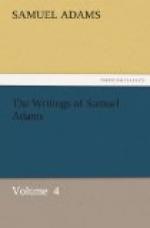Your,
TO JAMES WARREN.
[Ms., Samuel Adams Papers, Lenox Library.]
PHILADE NOVR 20 1780
MY DEAR SIR
In your Letter of the 17th of Septr which is still before me, you say “the Tongue of Malice has always been employd against me”; and in mentioning it you discover the Feelings of a Friend. It may perhaps in some Measure relieve those Feelings if I tell you, that it serves to make me more watchful over my self, lest by any Misconduct I might afford Occasion to the malicious Man to say things of me which would give me just Cause to be ashamd. It is said to be a Misfortune to a Man, when all speak well of him. Is it then an Advantage to a Man to have Enemies? It may be so if he has wisdom to make a good Use of them. We are apt to be partial in our own Judgment of our selves. Our Friends are either blind to our Faults or not faithful enough to tell us of them. The Malicious Man will speak all Manner of Evil against us, and contrive Means to send it Post haste to our Ears; and if among much Slander they say some Truths, what have we to do, but correct past Errors & guard against future ones. The Report which you mention as propagated of me is groundless. Would any Man in his Senses who wishes the War may be carried on with Vigor, prefer the temporary and expensive Drafts of Militia, to a permanent and well appointed Army! But Envy has no other Business than to calumniate.—
Mr Penny has deliverd me your favor of the 2d Instant. He has also brought us a Paper which exhibits a Picture of the Times. You express too much Resentment at the Ingratitude which you imagine has been shown to your Friend—that his Name is not to be found in any of the Lists—and especially, that he could not be supported in Competition with Mr Avery—Your Friend has no Claims on his Country, nor does he set himself in Competition with Mr A, who in some Respects is thought to be a necessary Man. He is one, whom, I confess, I regard for his Honesty and easy good Humour. We have been entertaind with the Speeches both before and after the putting on the Regalia; and we expect to see congratulatory Addresses from various Orders civil & ecclesiastical. I should pity the Governor if I thought him apt to be discomposd with the high Complimentary Stile. It is usual in all Honey Moons. I could wish to see, if we must have abundant Addresses, the manly Simplicity of Barcklay the Quaker in his Dedication to Charles the 2d of England. Excepting that Instance, I do not recollect to have seen an Address to a great Man, that was not more or less, & very often deeply, tincturd with Flattery.—If the Town Clerk of Ephesus has treated me “with very great Disrespect,” I am sorry for him. It gives me no Uneasiness on my own Account. If he “treats every one in that way who will not worship the Great Image,” he leaves me in




